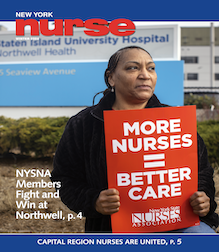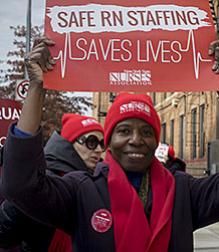
As we assemble for our Biennial Meeting, we see new and familiar faces. Our community of caregivers is as diverse as our nation, giving something unique to someone in need every day.
As nurses, we make a profound contribution to the quality of life of our patients. We learn things about people and the health system we work in that no one else could even imagine.
Knowledge is power – but power is an illusion if not activated. Our collective voice is power. Our collective actions – based on knowledge we gain as practitioners and our understanding of historic, socio-economic conditions that give rise to our reality – elevate this power further.
This Biennial meeting is designed to support the work that we do as nurses and arm us with tools to analyze and respond to the inherent weaknesses in our healthcare system that challenge care delivery.
What’s behind hospital mergers, acquisitions and “partnerships”?
The Corporate rhetoric is to “enhance quality, share best practices and protocols, and remove redundant services.” But, as our current revenue-driven model is what drives these systems, the real reason is to capture markets and close unprofitable hospitals – even though they are sorely needed.
These “Health Systems” carve up entire regions and monopolize the market so that they can negotiate better rates with insurers, thus cutting into their profits. While the ACA mandates coverage for formerly “uninsurable” sick people, it doesn’t restrict passing costs onto consumers. To recoup such “losses,” insurers and exchanges are already seeking huge rate increases. So while providers and insurers wrestle for profits, patients get stuck with higher bills.
And there’s more: as Employers partner with Health Systems, provider options to covered employees are restricted. A captive market has no bargaining power and – unless hospitals stand to make money on a given service – waits increase, as the cost of care skyrockets.
The great American health care scam
Why are Health Systems spending millions on marketing? If people believe they’re getting “the best,” it’s less painful to discover you have no other options. The net effect is these powerful mega-systems will collaborate to squeeze the work force. With a well-financed PR machine, opposition to safety measures, such as staffing ratios, will be overwhelming.
Large employers will sign contracts with these systems, restricting options for their employees and reducing health care costs – but these savings will never trickle down to employees.
Hospital employees will be forced to receive healthcare exclusively from their Employers, paying higher premiums for insurance. Hospitals capture yet another market (that includes us) even as they pay themselves back for providing benefits to their employees! Plus, they win “seamless care” grants from the government for doing this. Our own taxes will finance these corporate monsters’ schemes to obtain super-profits!
Alternatives to this health care dystopia
A comprehensive solution: Only a Single Payer system puts patient needs first. With a financing mechanism similar to Medicare, it would remove insurance companies from the equation for basic and necessary care. The U.S. is the only industrialized nation without such a system. We have higher morbidity and mortality rates, yet we spend far more per capita than any other nation in the world. Our corporate healthcare entities do an amazing job at mesmerizing the public into believing that we have a superior system. But for the vast majority of Americans that simply is not true. Don’t believe the hype.
Learn more about our healthcare system and what we can do to change it at a variety of workshops at the Biennial (see page 3), including the impact of Climate Change on the health and well-being of us all (see p. 4, 6 & 7). Join NYSNA colleagues as we march in the largest international Climate Change event ever, on Sunday, September 21, in NYC.
We save lives – let’s save our planet while we’re at it.




